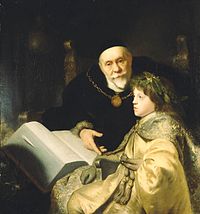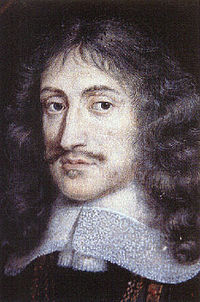- Charles I Louis, Elector Palatine
-
Charles Louis, (German: Karl I. Ludwig), Elector Palatine KG (22 December 1617 – 28 August 1680) was the second son of Frederick V of the Palatinate, the "Winter King" of Bohemia, and his wife, Princess Elizabeth, daughter of King James I of England (James VI of Scotland).
Contents
Biography
 The young Prince Charles Louis with his old teacher Volrad von Plesse, painting by Jan Lievens, 1631.
The young Prince Charles Louis with his old teacher Volrad von Plesse, painting by Jan Lievens, 1631.
After the death of his older brother in 1629, and of his father in 1632, Charles Louis inherited his exiled father's possessions in the Palatinate. Along with his younger brother Prince Rupert, he spent much of the 1630s at the court of his uncle in England, hoping to enlist English support for his cause. The young Elector Palatine was largely unsuccessful in this, and became gradually estranged from the King, who feared that Charles Louis might become a focus for opposition forces in England. Indeed, in the English crisis leading up to the outbreak of the English Civil War, Charles Louis had considerable sympathy for the parliamentary leaders, especially the Earl of Essex, feeling them more likely to come to the aid of the Palatinate on the continent. The Prince Palatine supported the execution of Strafford. Although Charles Louis was involved in the early stages of the Civil War with his uncle, he was mistrusted for his parliamentary sympathies, and soon returned to his mother in The Hague. There he distanced himself from the royalist cause in the Civil War, fearing that Charles would sell him out for Spanish support.
In 1644, Charles Louis returned to England at the invitation of Parliament. He took up residence in the Palace of Whitehall and took the Solemn League and Covenant, even though his brothers, Rupert and Maurice, were Royalist generals. Contemporaries (including King Charles) and subsequent generations believed that Charles Louis' motive in visiting Roundhead London was that he hoped that Parliament would crown him King, in place of his uncle. Charles Louis' endorsement of the Parliamentary party was a cause of enmity between uncle and nephew, and when a captive Charles I met his nephew once again in 1647, the elder Charles accused the Prince of angling after the English throne. Charles Louis was still in England in October 1648 when the Peace of Westphalia restored the Lower Palatinate to him (the Upper Palatinate, to his great disappointment, remained under the Elector of Bavaria). He remained in England long enough to see the execution of his uncle Charles I in January 1649, which appears to have come as a shock (nevertheless, the two had not reconciled prior to the King's death - Charles refused to see his nephew before his execution).
After this unhappy dénouement to Charles Louis's dubious participation in English politics, he at last returned to the now devastated Palatinate in the autumn of 1649. Over the more than thirty years of his reign there, he strove with some success to rebuild his shattered territory. In foreign affairs, he pursued a pro-French course, marrying his daughter Elizabeth Charlotte to Monsieur, Louis XIV's brother, in 1671. After his restoration, his relations with his relatives continued to deteriorate - his English relations never forgave him for his equivocal course in the Civil War, while his mother and siblings resented his parsimony.
The most notable facet of his reign was probably his unilateral divorce of his wife, Charlotte of Hesse-Kassel, and subsequent bigamous marriage to Marie Luise von Degenfeld. This second wife was given the unique title of Raugravine (Raugräfin, countess of uninhabited or uncultivated lands), and their children were known as the Raugraves.
Ancestry
Ancestors of Charles I Louis, Elector Palatine 16. Frederick III, Elector Palatine 8. Louis VI, Elector Palatine 17. Marie of Brandenburg-Kulmbach 4. Frederick IV, Elector Palatine 18. Philip I, Landgrave of Hesse 9. Elisabeth of Hesse 19. Christine of Saxony 2. Frederick V, Elector Palatine 20. William of Nassau 10. William I, Prince of Orange 21. Juliana of Stolberg 5. Louise Juliana von Orange-Nassau 22. Louis, Duke of Montpensier 11. Charlotte de Bourbon-Montpensier 23. Jacqueline de Longwy 1. Charles I Louis, Elector Palatine 24. Matthew Stewart, 4th Earl of Lennox 12. Henry Stuart, Lord Darnley 25. Margaret Douglas 6. James I of England 26. James V of Scotland 13. Mary, Queen of Scots 27. Mary of Guise 3. Elizabeth Stuart 28. Christian III of Denmark 14. Frederick II of Denmark 29. Dorothea of Saxe-Lauenburg 7. Anne of Denmark 30. Ulrich, Duke of Mecklenburg 15. Sofie of Mecklenburg-Schwerin 31. Princess Elizabeth of Denmark Family
Partner 1 Unknown Children 1. Ludwig von Seltz (1643–1660) Wife 1 Charlotte of Hesse-Kassel, 20 November 1627-16 March 1686, Kassel Married 22 February 1650 Kassel Children 1. Charles II, Elector Palatine (31 March 1651 - 26 May 1685) 2. Elizabeth Charlotte of the Palatinate (May 27, 1652 - 8 December 1722, Heidelberg) 3. Friedrich von der Pfalz, (12 May 1653 - 13 May 1653) Wife 2 Marie Luise von Degenfeld, 28 November 1634-18 March 1677, Strasbourg Married 6 January 1658 Schwetzingen Children 1. Karl Ludwig von der Pfalz (15 October 1658 - 12 August 1688) 2. Karoline von der Pfalz (19 November 1659 - 28 June 1696), married Meinhardt Schomberg, 3rd Duke of Schomberg 3. Luise von der Pfalz (25 January 1661 - 6 February 1733) 4. Ludwig von der Pfalz (b&d 1662) 5. Amalie Elisabeth von der Pfalz (1 April 1663 - 13 July 1709) 6. George Ludwig von der Pfalz (30 March 1664 - 20 July 1665) 7. Frederike von der Pfalz (7 July 1665 - 7 August 1674) 8. Friedrich Wilhelm von der Pfalz (25 November 1666 - 29 July 1667) 9. Karl Eduard von der Pfalz (19 May 1668 - 2 January 1690) 10. Sophie von der Pfalz (b&d 1669) 11. Karl Moritz von der Pfalz (9 January 1671 - 13 June 1702) 12. Karl August von der Pfalz (19 October 1672 - 20 September 1691) 13. Karl Kasimir von der Pfalz (1 May 1675 - 28 April 1691) Wife 3 Elisabeth Hollander von Bernau, 1659 - 8 March 1702 Schaffhausen Married 11 December 1679 Children 1. Charles Louis von der Pfalz (born 17 April 1681, Schaffhausen) Charles I Louis, Elector PalatineBorn: 22 September 1617 Died: 28 August 1680Regnal titles Preceded by
Frederick VElector Palatine
1648 (1632)-1680Succeeded by
Charles IIReferences
Categories:- House of Palatinate-Simmern
- Knights of the Garter
- English people of German descent
- 1617 births
- 1680 deaths
- Electors of the Palatinate
Wikimedia Foundation. 2010.

